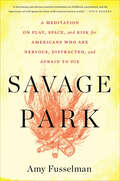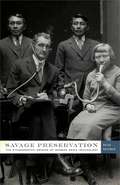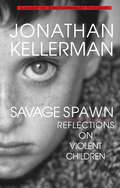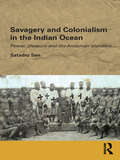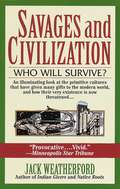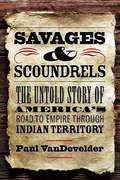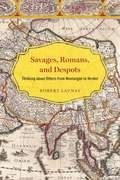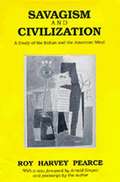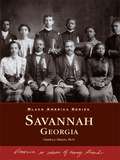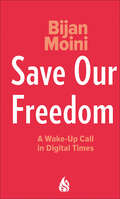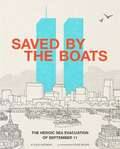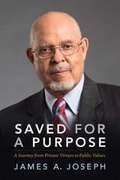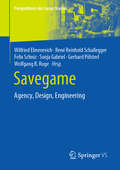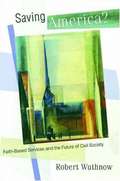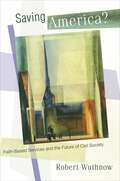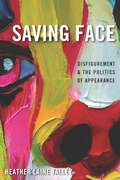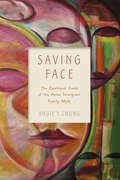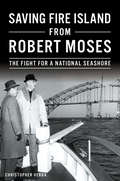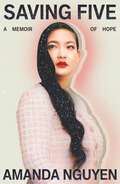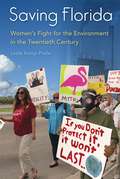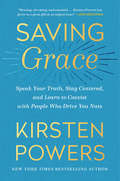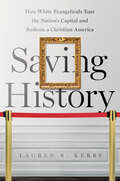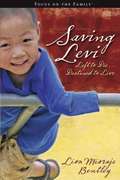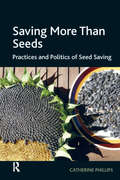- Table View
- List View
Savage Park: A Meditation on Play, Space, and Risk for Americans Who Are Nervous, Distracted, and Afraid to Die
by Amy Fusselman"A fascinating and daresay essential meditation on childhood, parenthood, and the importance of wild spaces for those wild creatures known as kids."—Dave Eggers How fully can the world be explored when you are focused on trying not to die? This is the question that lies at the heart of Amy Fusselman&’s Savage Park. America is the land of safety, of protecting children to make sure that nothing can possibly hurt them. But while on a trip to Tokyo with her family, Fusselman stumbled upon an adventure playground called Hanegi Playpark, where children sawed wood, hammered nails, and built open fires. Her conceptions of space, risk, and play were shattered. In asking us to reexamine fundamental ideas about our approaches to space and risk and how we pass these concepts down to our children, Fusselman also asks us to look at the world in a different way. Perhaps it isn&’t variety, but fear that is the spice of life. This startling revelation is at the heart of Savage Park, and will make readers look at the world in a whole new way. &“I yield to no one in my admiration for Amy Fusselman&’s work. Her new book, Savage Park, further explores with astonishing power, eloquence, precision, and acid humor her obsessive, necessary theme: the gossamer-thin separation between life and death.&” —David Shields, author of Reality Hunger &“In this unusually refreshing meditation (which reads like a novel), we are given a tour of the space around and within us. With poetic efficiency Amy Fusselman reveals what makes us savage or not; why secret, wild spaces are essential; and why playing should be taken seriously.&” —Philippe Petit, high-wire artist
Savage Preservation: The Ethnographic Origins of Modern Media Technology
by Brian HochmanDuring the late nineteenth and early twentieth centuries, writers and anthropologists believed that the world&’s primitive races were on the brink of extinction. They also believed that films, photographs, and phonographic recordings—modern media in their technological infancy—could capture lasting relics of primitive life before it vanished into obscurity. For many Americans, the promise of media and the problem of race were inextricably linked. While professional ethnologists tried out early recording machines to preserve the sounds of authentic indigenous cultures, photographers and filmmakers hauled newfangled equipment into remote corners of the globe to document rituals and scenes that seemed destined to vanish forever. In Savage Preservation, Brian Hochman shows how widespread interest in recording vanishing races and disappearing cultures influenced audiovisual innovation, experimentation, and use in the United States. Drawing extensively on seldom-seen archival sources—from phonetic alphabets and sign language drawings to wax cylinder recordings and early color photographs—Hochman uncovers the parallel histories of ethnography and technology in the turn-of-the-century period. While conventional wisdom suggests that media technologies work mostly to produce ideas about race, Savage Preservation reveals that the reverse has also been true. During this period, popular conceptions of race constructed the authority of new media technologies as reliable archives of the real. Brimming with nuanced critical insights and unexpected historical connections, Savage Preservation offers a new model for thinking about race and media in the American context—and a fresh take on a period of accelerated technological change that closely resembles our own.
Savage Spawn: Reflections on Violent Children
by Jonathan Kellerman"Ethically and morally, kids are works in progress. Throw in psychopathy and you've got a soul that will never be complete." In this powerful, disturbing book, bestselling author and noted child psychologist Jonathan Kellerman shines a penetrating light on antisocial youth--kids who kill without remorse--asserting that "psychopathic tendencies begin very early in life, as young as three, and they endure." Criticizing our quick impulse to blame violent movies or a "morally bankrupt" society, Kellerman convinces us that it is the kids themselves who need to be examined. Carefully. How do children become cold-blooded killers? Kellerman warns that today's aggressive bully is tomorrow's Mafia don, cult leader, or genocidal dictator. Violently psychopathic youths possess an overriding need for power, control, and stimulation, and all display a complete lack of regard for the humanity of others. He examines the origins of psychopathy and the ever-shifting debate between nurture and nature, offering some controversial solutions to dealing with homicidal tendencies in children. As timely as today's headlines, more gripping than fiction, Savage Spawn is a provocative look at the links between society and biology, children and violence. Kellerman's sobering message will remain with you long after the last page is turned.From the Trade Paperback edition.
Savagery and Colonialism in the Indian Ocean: Power, Pleasure and the Andaman Islanders (Routledge/Edinburgh South Asian Studies Series)
by Satadru SenThis book examines the social, political and ideological dimensions of the encounter between the indigenous inhabitants of the Andaman islands, British colonizers and Indian settlers in the eighteenth and nineteenth centuries. The British-Indian penal settlements in the Andaman Islands – beginning tentatively in 1789 and renewed on a larger scale in 1858 – represent an extensive, complex experiment in the management of populations through colonial discourses of race, criminality, civilization, and savagery. Focussing on the ubiquitous characterization of the Andaman islanders as ‘savages’, this study explores the particular relationship between savagery and the practice of colonialism. Satadru Sen examines savagery and the savage as dynamic components of colonialism in South Asia: not intellectual abstractions with clear and fixed meanings, but politically ‘alive’ and fiercely contested products of the colony. Illuminating and historicizing the processes by which the discourse of savagery goes through multiple and fundamental shifts between the late eighteenth and late nineteenth centuries, he shows the links and breaks between these shifts and changing ideas of race, adulthood and masculinity in the Andamans, British India, Britain and in the wider empire. He also highlights the implications of these changes for the ‘savages’ themselves. At the broadest level, this book re-examines the relationship between the modern and the primitive in a colonial world.
Savages and Civilization: Who Will Survive?
by Jack WeatherfordIn Indian Givers and Native Roots, renowned anthropologist Jack Weatherford opened the eyes of tens of thousands of readers to the clash between Native American and European cultures. Now, in his brilliant new book, Weatherford broadens his focus to examine how civilization threatens to obliterate unique tribal and ethnic cultures around the world -- and in the process imperils its own existence. As Weatherford explains, the relationship between "civilized" and "savage" peoples through history has encompassed not only violence, but also a surprising degree of cooperation, mutual influence, trade, and intermarriage. But this relationship has now entered a critical stage everywhere in the world, as indigenous peoples fiercely resist the onslaught of a global civilization that will obliterate their identities. Savages and Civilization powerfully demonstrates that our survival as a species is based not on a choice between savages and civilization, but rather on a commitment to their vital coexistence.
Savages and Scoundrels: The Untold Story of America's Road to Empire Through Indian Territory
by Paul VandevelderThis gripping book tells America's story from a new perspective, revealing a pattern of fraudulent government behavior that displaced Native Americans from their lands. It chronicles the adventures of our forefathers and showing how a legacy of repeated betrayals became the bedrock on which the republic was built.
Savages, Romans, and Despots: Thinking about Others from Montaigne to Herder
by Robert LaunayFrom the sixteenth to the eighteenth centuries, Europeans struggled to understand their identity in the same way we do as individuals: by comparing themselves to others. In Savages, Romans, and Despots, Robert Launay takes us on a fascinating tour of early modern and modern history in an attempt to untangle how various depictions of “foreign” cultures and civilizations saturated debates about religion, morality, politics, and art. Beginning with Mandeville and Montaigne, and working through Montesquieu, Diderot, Gibbon, Herder, and others, Launay traces how Europeans both admired and disdained unfamiliar societies in their attempts to work through the inner conflicts of their own social worlds. Some of these writers drew caricatures of “savages,” “Oriental despots,” and “ancient” Greeks and Romans. Others earnestly attempted to understand them. But, throughout this history, comparative thinking opened a space for critical reflection. At its worst, such space could give rise to a sense of European superiority. At its best, however, it could prompt awareness of the value of other ways of being in the world. Launay’s masterful survey of some of the Western tradition’s finest minds offers a keen exploration of the genesis of the notion of “civilization,” as well as an engaging portrait of the promises and perils of cross-cultural comparison.
Savagism and Civilization: A Study of the Indian and the American Mind
by Roy Harvey PearceFirst published in 1953, revised in 1964, and presented here with a new foreword by Arnold Krupat and new postscript by the author, Roy Harvey Pearce's "Savagism and Civilization" is a classic in the genre of history of ideas. Examining the political pamphlets, missionaries' reports, anthropologists' accounts, and the drama, poetry, and novels of the 18th and early 19th centuries, Professor Pearce traces the conflict between the idea of the noble savage and the will to Christianize the heathen and appropriate their land, which ended with the near extermination of Native American culture.
Savannah, Georgia (Black America Series)
by Charles J. ElmorePioneering African-American families, spanning generations from slavery to freedom, enrich Savannah's collective history. Men and women such as Andrew Bryan, founder of the nation's oldest continuous black Baptist church; the Rev. Ralph Mark Gilbert, who revitalized the NAACP in Savannah; and Rebecca Stiles Taylor, founder of the Federation of Colored Women Club, are among those lauded in this retrospective. Savannah's black residents have made immeasurable contributions to the city and are duly celebrated and remembered in this volume.
Save Our Freedom: A Wake-Up Call in Digital Times
by Bijan MoiniAbout the achievement of freedom - and how we willingly sacrifice it today. Freedom is something we take for granted—a fundamental human right we assume will always be there, and that we complain about vocally when we feel it&’s being upon. But in reality, the number of countries in which people can live freely is decreasing for the first time in decades. Bijan Moini&’s new book is a jarring wake-up call: if we aren&’t careful, our freedoms may be stripped away, too, and it might be our own fault. Vividly describing the current landscape of civil liberties in our capitalistic and digital age, Save Our Freedom! explains the immense importance the principle plays in our day-to-day, and outlines concrete actionable measures to fight back.
Saved by the Boats: The Heroic Sea Evacuation of September 11 (Encounter: Narrative Nonfiction Picture Bks.)
by Julie Gassman Steve MoorsSeptember 11, 2001 was a black day in U.S. history. Amid the chaos, sea captains and crews raced by boat to the tragic Manhattan scene. Nearly 500,000 people on Manhattan Island were rescued that day in what would later be called the largest sea evacuation in history. In this rarely told story of heroism, we come to understand that in our darkest hours, people shine brightly as a beacon of hope.
Saved for a Purpose: A Journey from Private Virtues to Public Values
by James A. JosephThe son of a minister, James A. Joseph grew up in Louisiana's Cajun country, where his parents taught him the value of education and the importance of serving others. These lessons inspired him to follow a career path that came to include working in senior executive or advisory positions for four U. S. Presidents and with the legendary Nelson Mandela to build a new democracy in South Africa. Saved for a Purpose is Joseph's ethical autobiography, in which he shares his moral philosophy and his insights on leadership. In an engaging and personal style, Joseph shows how his commitment to applying moral and ethical principles to large groups and institutions played out in his work in the civil rights movement in Alabama and as a college chaplain in California in the turbulent 1960s. His time later as vice president of the Cummins Engine Company provided an opportunity to promote corporate ethics, and his tenure as Under Secretary of the Interior in the Carter Administration underscored the difficulty and weight of making the right decisions while balancing good policy analysis with transcendent moral principles. In 1996 President Clinton selected Joseph to become the United States Ambassador to South Africa. His recollections of working with Nelson Mandela, whom he describes as a noble and practical politician, and his observations about what he learned from Desmond Tutu and others about reconciliation contain some of the book's most poignant passages.Saved for a Purpose is unique, as Joseph combines his insights from working to integrate values into America's public and private sectors with his long engagement with ethics as an academic discipline and as a practical guide for social behavior. Ultimately, it reflects Joseph's passionate search for values that go beyond the personal to include the ethical imperatives that should be applied to the communal.
Savegame: Agency, Design, Engineering (Perspektiven der Game Studies)
by Wilfried Elmenreich René Reinhold Schallegger Felix Schniz Sonja Gabriel Gerhard Pölsterl Wolfgang B. RugeDer Band bietet eine Zusammenschau theoretischer und praktischer Perspektiven, die sich rund um das Thema Videospiel, die Erhaltung von Information und die Beharrung auf traditionellen Designparadigmen ergeben. Die Beiträge gehen über ihre jeweiligen Disziplinen von der verbindenden Metapher des Savegames (Speicherstandes) hinaus, um unterschiedlichste Aspekte des Designs, der Bewahrung und der Kritik von Spielen verfügbar und vernetzt nutzbar zu machen. Technische und kulturwissenschaftliche Zugänge ergänzen sich und stellen den Lesern multifunktionale Werkzeuge zur Nutzung, Schaffung und Analyse von Videospielen zur Verfügung.Die Herausgeber*innenProf. Dipl.-Ing. Dr. Wilfried Elmenreich ist Informationstechniker am Institut für Vernetzte und Eingebettete Systeme und hält einen Lehrstuhl für Smart Grids an der Alpen-Adria-Universität Klagenfurt.Mag. Dr. René Reinhold Schallegger arbeitet im Bereich der anglophonen Kulturwissenschaften sowie der Game Studies und ist Assoziierter Professor am Institut für Anglistik und Amerikanistik.Felix Schniz MA ist Universitätsassistent und Doktoratsstudierender am Institut für Anglistik und Amerikanistik der Alpen-Adria-Universität Klagenfurt.Gemeinsam sind sie die Begründer des Masterstudiengangs Game Studies and Engineering an der Alpen-Adria-Universität Klagenfurt.Sonja Gabriel ist Hochschulprofessorin für Medienpädagogik und Mediendidaktik an der KPH Wien/Krems und in der Pädagog*innenbildung tätig. Sie forscht und publiziert im Bereich Digital Game-Based Learning und Wertevermittlung durch digitale Spiele.Mag. Gerhard Pölsterl ist Fachreferent für Medienpädagogik im Bundeskanzleramt Österreich. Im Bereich Gaming ist er für die Bundesstelle für die Positivprädikatisierung von digitalen Spielen (BuPP.at) zuständig.Wolfgang B. Ruge MA ist Lektor an der Universität Wien und Geschäftsführer der Bildungsgrund. Agentur- und Kultur und Medienpädagogik KG.
Saving America: Faith-Based Services and the Future of Civil Society
by Robert WuthnowThe author discusses whether congregations are effective vehicles for providing broad-based social programs and whether they are actually fostering the civil society.
Saving America?: Faith-Based Services and the Future of Civil Society
by Robert WuthnowOn January 29, 2001, President George W. Bush signed an executive order creating the White House Office of Faith-Based and Community Initiatives. This action marked a key step toward institutionalizing an idea that emerged in the mid-1990s under the Clinton administration--the transfer of some social programs from government control to religious organizations. However, despite an increasingly vocal, ideologically charged national debate--a debate centered on such questions as: What are these organizations doing? How well are they doing it? Should they be supported with tax dollars?--solid answers have been few. In Saving America? Robert Wuthnow provides a wealth of up-to-date information whose absence, until now, has hindered the pursuit of answers. Assembling and analyzing new evidence from research he and others have conducted, he reveals what social support faith-based agencies are capable of providing. Among the many questions he addresses: Are congregations effective vehicles for providing broad-based social programs, or are they best at supporting their own members? How many local congregations have formal programs to assist needy families? How much money do such programs represent? How many specialized faith-based service agencies are there, and which are most effective? Are religious organizations promoting trust, love, and compassion? The answers that emerge demonstrate that American religion is helping needy families and that it is, more broadly, fostering civil society. Yet religion alone cannot save America from the broad problems it faces in providing social services to those who need them most. Elegantly written, Saving America? represents an authoritative and evenhanded benchmark of information for the current--and the coming--debate.
Saving Animals: Multispecies Ecologies of Rescue and Care
by Elan AbrellA fascinating and unprecedented ethnography of animal sanctuaries in the United States In the past three decades, animal rights advocates have established everything from elephant sanctuaries in Africa to shelters that rehabilitate animals used in medical testing, to homes for farmed animals, abandoned pets, and entertainment animals that have outlived their &“usefulness.&” Saving Animals is the first major ethnography to focus on the ethical issues animating the establishment of such places, where animals who have been mistreated or destined for slaughter are allowed to live out their lives simply being animals. Based on fieldwork at animal rescue facilities across the United States, Elan Abrell asks what &“saving,&” &“caring for,&” and &“sanctuary&” actually mean. He considers sanctuaries as laboratories where caregivers conceive and implement new models of caring for and relating to animals. He explores the ethical decision making around sanctuary efforts to unmake property-based human–animal relations by creating spaces in which humans interact with animals as autonomous subjects. Saving Animals illustrates how caregivers and animals respond by cocreating new human–animal ecologies adapted to the material and social conditions of the Anthropocene.Bridging anthropology with animal studies and political philosophy, Saving Animals asks us to imagine less harmful modes of existence in a troubled world where both animals and humans seek sanctuary.
Saving Face: Disfigurement and the Politics of Appearance
by Heather Laine TalleyWinner, Body and Embodiment Award presented by the American Sociological AssociationImagine yourself without a face—the task seems impossible. The face is a core feature of our physical identity. Our face is how others identify us and how we think of our ‘self’. Yet, human faces are also functionally essential as mechanisms for communication and as a means of eating, breathing, and seeing. For these reasons, facial disfigurement can endanger our fundamental notions of self and identity or even be life threatening, at worse. Precisely because it is so difficult to conceal our faces, the disfigured face compromises appearance, status, and, perhaps, our very way of being in the world.In Saving Face, sociologist Heather Laine Talley examines the cultural meaning and social significance of interventions aimed at repairing faces defined as disfigured. Using ethnography, participant-observation, content analysis, interviews, and autoethnography, Talley explores four sites in which a range of faces are “repaired:” face transplantation, facial feminization surgery, the reality show Extreme Makeover, and the international charitable organization Operation Smile,. Throughout, she considers how efforts focused on repair sometimes intensify the stigma associated with disfigurement. Drawing upon experiences volunteering at a camp for children with severe burns, Talley also considers alternative interventions and everyday practices that both challenge stigma and help those seen as disfigured negotiate outsider status.Talley delves into the promise and limits of facial surgery, continually examining how we might understand appearance as a facet of privilege and a dimension of inequality. Ultimately, she argues that facial work is not simply a conglomeration of reconstructive techniques aimed at the human face, but rather, that appearance interventions are increasingly treated as lifesaving work. Especially at a time when aesthetic technologies carrying greater risk are emerging and when discrimination based on appearance is rampant, this important book challenges us to think critically about how we see the human face.
Saving Face: The Emotional Costs of the Asian Immigrant Family Myth
by Angie Y. ChungTiger Mom. Asian patriarchy. Model minority children. Generation gap. The many images used to describe the prototypical Asian family have given rise to two versions of the Asian immigrant family myth. The first celebrates Asian families for upholding the traditional heteronormative ideal of the "normal (white) American family" based on a hard-working male breadwinner and a devoted wife and mother who raises obedient children. The other demonizes Asian families around these very same cultural values by highlighting the dangers of excessive parenting, oppressive hierarchies, and emotionless pragmatism in Asian cultures.<P><P> Saving Face cuts through these myths, offering a more nuanced portrait of Asian immigrant families in a changing world as recalled by the people who lived them first-hand: the grown children of Chinese and Korean immigrants. Drawing on extensive interviews, sociologist Angie Y. Chung examines how these second-generation children negotiate the complex and conflicted feelings they have toward their family responsibilities and upbringing. Although they know little about their parents' lives, she reveals how Korean and Chinese Americans assemble fragments of their childhood memories, kinship narratives, and racial myths to make sense of their family experiences. However, Chung also finds that these adaptive strategies come at a considerable social and psychological cost and do less to reconcile the social stresses that minority immigrant families endure today.<P> Saving Face not only gives readers a new appreciation for the often painful generation gap between immigrants and their children, it also reveals the love, empathy, and communication strategies families use to help bridge those rifts.
Saving Fire Island from Robert Moses: The Fight for a National Seashore
by Christopher C. VergaSmall coastal communities stand up to the giant of mid-20th century urban development in this chronicle of a true David and Goliath drama. With its unspoiled, tranquil shorelines, Fire Island has been an oasis for vacationers for well over a century. But from the late 1930s into the early 1960s, it was an obsession for Robert Moses, the political power broker and "master builder" who reshaped much of New York. His urban development projects helped create Long Island&’s suburbs, and he dreamed of turning Fire Island into an extension of Ocean Parkway. Standing up to those ambitions were the seventeen individualistic communities of Fire Island, unified in their love for their sun-washed sandy beaches. To maintain a traditional way of life with limited access to motor vehicles, the community began the fight for federal protection through the creation of the Fire Island National Seashore.
Saving Five: A Memoir of Hope
by Amanda NguyenAn Instant New York Times Bestseller and a New York Times Book Review Editors' Choice. Natalie Portman’s Book Club Pick for March. <p> "Amanda’s story—innovatively told by versions of herself at different ages—underscores the lasting power of speaking your truth, building a movement, and never losing sight of your dreams.” —Melinda French Gates. <p> "In Saving Five, Amanda Nguyen shows us how to reclaim the full spectrum of our lives, replete with pain, fury, creativity, and recovered dreams.” —Chanel Miller, author of Know My Name. <p> A brave and imaginative memoir by the Nobel Peace Prize nominee Amanda Nguyen, detailing her healing journey and groundbreaking activism in the aftermath of her rape at Harvard. <p> In 2013, the trajectory of Amanda Nguyen’s life was changed forever when she was raped at Harvard. Determined to not let her assault derail her goal of joining NASA after graduation, Nguyen opted for her rape kit to be filed under “Jane Doe.” But she was shocked to learn her choice to stay anonymous gave her only six months to take action before the state destroyed her kit, rendering any future legal action impossible. Nguyen knew then that she had two options: surrender to a law that effectively denied her justice, or fight for a change—not only for herself but for survivors everywhere. <p> A heart-wrenching memoir of survival and hope, Saving Five boldly braids the story of Nguyen’s activism—which resulted in Congress’s unanimous passage of the Sexual Assault Survivors’ Rights Act in 2016—with a second, beautifully imagined adventure, of Nguyen's younger selves as they—at ages five, fifteen, twenty-two, and thirty—navigate through dramatic incarnations of the emotional stages of her path toward healing, not only from her rape but from the violent turmoil of her childhood. The result is a groundbreaking work that seamlessly blends memoir with a moving journey toward acceptance and hope, forging a path ahead that is as inspiring as it is instructive. <p> From one of the most influential activists (and now astronauts) of her time, Saving Five is at once a tribute to resilience, a celebration of healing through action, and a resounding cry to change the world. <b>new York Times Bestseller</b>
Saving Florida: Women's Fight for the Environment in the Twentieth Century
by Leslie Kemp PooleIn Saving Florida, Leslie Kemp Poole casts new light on the women at the forefront of Florida’s environmental movement. From creating parks to protesting air pollution, fighting dredge-and-fill operations, and exposing the health dangers of pesticides, these women caused unprecedented changes in how the Sunshine State values its many and marvelous natural resources.At the beginning of the twentieth century women didn’t have the vote, but by the end of the century they were founding issue-specific groups, like Friends of the Everglades, and running state and federal agencies, including the U.S. Environmental Protection Agency. They set the foundation for the next century’s environmental agenda, which came to include the idea of sustainable development, which meshes ecology and economy to enhance energy efficiency and the function of natural systems.This is an indispensable history that not only underscores the importance of women in the environmental movement but also shows how as a collective force they forever altered how others saw women’s roles in society.
Saving Grace: Speak Your Truth, Stay Centered, and Learn to Coexist with People Who Drive You Nuts
by Kirsten PowersThe CNN senior political analyst and USA Today columnist offers a path to navigating the toxic division in our culture without compromising our convictions and emotional well-being, based on her experience as a journalist during the Trump era, interviews with experts, and research on what leads people to actually change their minds.&“Bracing, elevating, and essential . . . Kirsten Powers has given us a great gift at an urgent hour.&” —Jon MeachamFor years, New York Times bestselling author Kirsten Powers has been center stage for many of our nation&’s most searing political and cultural battles as a columnist, TV analyst, and one-time participant in the thunderdome of Twitter. On a good day, there will be civil disagreement. On a bad day, it&’s all-out trench warfare—nothing but a cycle of outrage and self-righteousness. More and more, Powers finds herself wondering, along with countless Americans: How are we to cope with this non-stop madness?In Saving Grace, Powers writes with wit and insight about our country&’s poisonous political discourse, chronicling the efforts she&’s made to stay grounded and preserve her sanity in a post-truth era that has driven many of us to the edge. She draws on lessons offered by faith leaders, therapists, theologians, social scientists, and activists working for change today. She dismantles the widespread misconception that grace means being nice, letting people get away with harmful behavior, or choosing neutrality in the name of peace. Grace, she argues, is anything but an act of surrender; instead, it is a kinetic and transformative force.Saving Grace offers a template for a different kind of America, one where we can engage with people who hold opposing views without sacrificing our values or our passionate beliefs in the causes we care about. It&’s a culture that embraces repentance and repair, a process through which those who have caused harm can take responsibility and work toward righting the wrongs in which they have participated. It&’s a place where we&’re empowered to see the possibility in other people, even people who are driving us nuts. Provocative, original, and filled with deep wisdom, Saving Grace is an essential read for anyone engaged in the struggle to live compassionately in an era of relentless demonization and division.
Saving History: How White Evangelicals Tour the Nation's Capital and Redeem a Christian America (Where Religion Lives)
by Lauren R. KerbyMillions of tourists visit Washington, D.C., every year, but for some the experience is about much more than sightseeing. Lauren R. Kerby's lively book takes readers onto tour buses and explores the world of Christian heritage tourism. These expeditions visit the same attractions as their secular counterparts—Capitol Hill, the Washington Monument, the war memorials, and much more—but the white evangelicals who flock to the tours are searching for evidence that America was founded as a Christian nation. The tours preach a historical jeremiad that resonates far beyond Washington. White evangelicals across the United States tell stories of the nation's Christian origins, its subsequent fall into moral and spiritual corruption, and its need for repentance and return to founding principles. This vision of American history, Kerby finds, is white evangelicals' most powerful political resource—it allows them to shapeshift between the roles of faithful patriots and persecuted outsiders. In an era when white evangelicals' political commitments baffle many observers, this book offers a key for understanding how they continually reimagine the American story and their own place in it.
Saving Levi: Left to Die, Destined to Live
by Lisa Misraje BentleyA baby boy is found in a field in China. He has been burned over most of his body and left to die in is burial clothes. This is the story of an American famly running an orphanage for Chinese special-needs children. They recover the child from a chinese man. The Americans save him first in hospitals in China and then, through help from all over the world and their belief in God, bring the baby to the U.S. for treatment.
Saving More Than Seeds: Practices and Politics of Seed Saving
by Catherine PhillipsSaving More Than Seeds advances understandings of seed-people relations, with particular focus on seed saving. The practice of reusing and exchanging seeds provides foundation for food production and allows humans and seed to adapt together in dynamic socionatural conditions. But the practice and its practitioners are easily taken for granted, even as they are threatened by neoliberalisation. Combining original ethnographic research with investigation of an evolving corporate seed order, this book reveals seed saving not only as it occurs in fields and gardens but also as it associates with genebanking, genetic engineering, intellectual property rights, and agrifood regulations. Drawing on diverse social sciences literatures, Phillips illustrates ongoing practices of thinking, feeling, and acting with seeds, raising questions about what seed-people relations should accomplish and how different ways of relating might be pursued to change collective futures.
